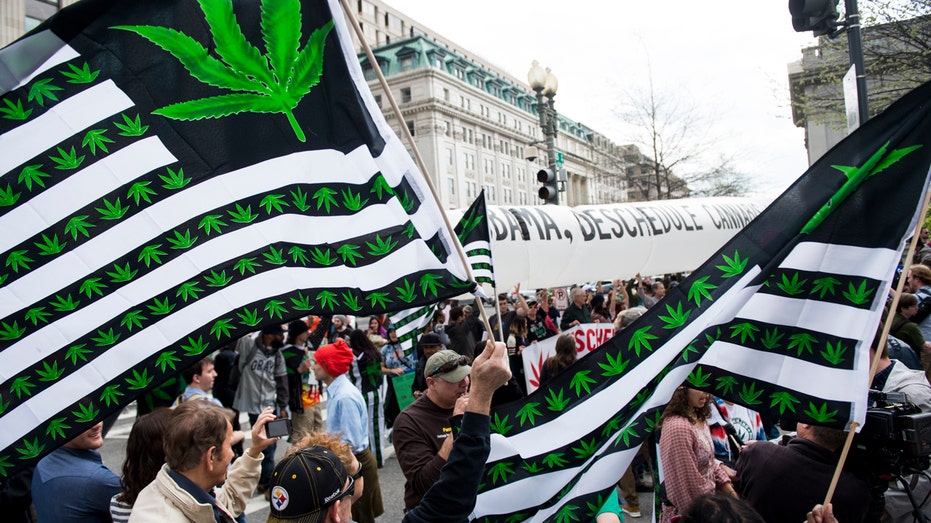Pot was hardly difficult to find on campuses—and elsewhere—back when it was not just illegal but actively targeted by politicians as a menace to society. In fact, it often found you if you stopped in at parties or even small gatherings. When I was in college, there was a real fear of being busted by police, getting kicked out of school, or fired from your job. It made otherwise law-abiding kids see the cops as their enemy. But that was light-years ago.
—
### Changing Attitudes Toward Marijuana
Now, the Trump administration is strongly considering loosening the restrictions on weed. It still amazes me to drive up Connecticut Avenue here in Washington and see cannabis shops—like MrGreen and Blunt-and Taste Budz—just a few blocks from the Capitol, openly peddling the stuff. The products are branded under highly marketable names, such as Violet Sky and Hash Burger.
A well-reported story by the Free Press says President Trump is considering reclassifying marijuana from a Schedule I drug to Schedule III. That would put it in the same category as anabolic steroids, ketamine, and Tylenol with codeine. The move “would ease restrictions on it but stop short of making pot entirely legal.”
Of course, medical marijuana is already legal in 40 states and the District of Columbia, and allowed for recreational use in D.C. and 24 states—from New York to Colorado.
—
### Minimal Opposition and Political Support
So where is the opposition? Uh, there really isn’t that much. And the White House is being open about this. Marijuana advocate Alex Bruesewitz tells the Free Press that the shift to Schedule III “keeps cannabis as a controlled substance but allows for more testing for medicinal purposes,” calling it a “politically savvy move” with strong public support.
It’s perhaps no surprise. Generations have at least tried weed since the 1960s and ’70s, dismissing the dark warnings about its dangers and the claim that it would lead to harder drugs. They scoffed at the infamous 1936 film *Reefer Madness*.
—
### A History of Political Opposition
Richard Nixon, in his war on drugs half a century ago, tried to associate hippies with pot and Black Americans with heroin. As his top aide John Ehrlichman—who later went to prison for Watergate—said in a 1994 interview: “Did we know we were lying about the drugs? Of course we did.”
Ronald Reagan, who as a candidate called pot “probably the most dangerous drug in the United States,” admitted in his diary that he got mad watching Jane Fonda, Lily Tomlin, and Dolly Parton toking up in the movie *9 to 5*. His wife Nancy Reagan later launched her famous “Just Say No” campaign.
By the time Bill Clinton ran for office, his brief experimentation with pot—he famously said he had tried it but “didn’t inhale”—had become a political punchline.
—
### Emerging Criticism
Some critics have definitely emerged. Pete Sessions, a GOP congressman from Texas, recently wrote to Attorney General Pam Bondi along with eight other lawmakers, warning that rescheduling marijuana “would send a message to kids that marijuana is not harmful.”
Donald Trump himself doesn’t smoke, drink, or take drugs, partly in reaction to his brother’s death from alcoholism. But the White House seems largely on board with the idea of rescheduling. Trump pollster Tony Fabrizio conducted a survey in March that found 66 percent of respondents backed legalized marijuana, and 70 percent supported rescheduling the drug.
A senior White House official is quoted as saying: “For a lot of the base, it’s an issue like gay marriage that people have gotten comfortable with. It’s good politics.” A decision is expected by the end of the year.
—
### The Role of Lobbyists and the Cannabis Industry
As with virtually every Beltway issue, well-heeled lobbyists are part of the process. Pot smoking, once an underground pastime, is now a big business.
Bruesewitz’s consulting firm, X Strategies, is reportedly being paid $300,000 by American Rights and Reform, a pro-cannabis group, for “media” services. Another large PR firm, Mercury Public Affairs, represents the U.S. Cannabis Council.
The size of this burgeoning industry was estimated at $38 billion last year—real money, even by jaded Washington standards.
—
### Mixed Feelings About Today’s Cannabis
I confess to some mixed feelings. For one thing, today’s cannabis is many times more powerful than the nickel-and-dime bags that used to circulate. I always felt pot’s milder effects were preferable to alcohol, especially when it comes to driving. It does give you the munchies, though. And as a parent, I wonder—what about homework?
https://www.foxnews.com/media/dialing-down-dope-trump-white-house-moves-toward-easing-restrictions-marijuana

Be First to Comment